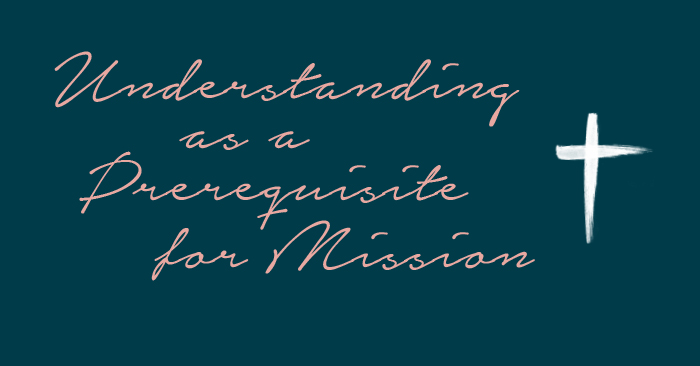Identities & Cultures
Understanding as a Prerequisite for Mission

I am Roma, but I was raised in a non-Roma community. I was 18 when I gave my life to God. As I was reading my Bible, I came to the story of Moses. God revealed to me He was sending me to my people to share the good news. Therefore, it was inevitable that I needed to be changed inside and outside, and also study Roma communities on a deeper level.
I became interested in the history, culture, habits, lifestyle and language of my own people.
I visited several different communities, mostly Hungarian Roma. One of my friends said: “All Roma communities are completely different. The Roma are not a coherent mass. Therefore, it is unavoidable [that you need] to learn a lot about them.” In my personal experience, I have found that this is indeed vital.
As Roma, we have a unique perspective about how we see the world, others and ourselves. My experience is that whether we take this into account or fail to do so will affect our approach to mission.
The Roma and Identity
After my conversion to Christianity, I had to redefine my life and my identity. The latter has taken years and it is still happening. Since there were no Roma Christians with a healthy identity around me who had gone through this process and therefore could help me in it, it was only the grace of God that helped me redefine my Roma identity. Today I can describe myself as a Christian Hungarian with Roma origins. That being said, I think there are other good ways to declare a healthy Christian Roma identity.
Often, the identity and self-esteem of different Roma communities determine how they approach the larger society.
For example, in Hungary, Carpathian, Vlah, and woodworker (trough-maker) Roma groups each have a different view of themselves and of others.
If we imagine a theoretical pyramid starting from the top (the most elite) down to the bottom, each Roma group would put themselves, other Roma groups and non-Roma people in different places on this pyramid. This affects how they welcome and accept missionaries (and their message).
In most of the poor woodworker (trough-maker) and Hungarian Roma communities, we can observe some level of identity crisis. They are not proud to be Roma, because they are often surrounded by prejudice and they can sense and see they are despised. Missionaries primarily target these disadvantaged communities—why is this the case? When a mission or ministry reaches these particular Roma–since they see no other option–they are compelled (or maybe they try) to conform to the missionary’s value system and expectations of the majority society. Sometimes, this is because missionaries focus on changing cultural factors rather than focusing on the gospel—this leads to a dead-end in mission.
When Roma from this group are born again or hear the gospel, a key need is to build up or redefine their Roma identity. This raises the question: Can a non-Roma minister help them with this and if yes, how?
In the case of Roma people who already have a stronger identity (e.g. Vlah Roma), when they become a Christian, they only need to discover how they can live their Roma identity in a biblical way, rather than feeling like they need to try to adhere to all the expectations of the majority society. They can live with their chin up—as a devoted Christian, yet also fully Roma.
Roma People and Education
Education had a great emphasis in my life, even though my circumstances or finances have not always allowed me to study.
As I mentioned before, Roma people are not a coherent mass, so education has a different meaning in each of the communities.
The disadvantaged Hungarian Roma people tend to see education as the key to their elevation. They are more dependent on the majority society than, for example, Gabor Roma communities, so they need to live and succeed with a lifestyle similar to the non-Roma people.
Groups like the Gabor Roma people usually live in more closed communities, trying to stay independent from society’s expectations. Though globalization has had a significant effect on their culture, they still reject any efforts that would assimilate their style of life. The community is self-sufficient; they don’t feel the need for further education. Gabor Roma have been masters of metalwork for centuries and the women run businesses. This also indicates that these Roma live their lives in a completely different social structure. Their children do not want higher education, because they do not need it to live in their communities.
Despite this, the Gabor Roma study things that benefit their way of life. All the men have to get a driving license at a young age. They learn all the main routes of travel through Europe by heart. All of them speak Romani, Romanian and Hungarian very well and often they also speak French and some Slavic languages. More recently, they learned German and English for everyday communication. Many people think education will help the Roma to integrate into mainstream society. I don’t believe this is true—education without the gospel will not change hearts.
Mission in Christ’s Way
Trustworthiness is a key characteristic for missionaries. What does it mean to be a trustworthy person? To be devoted? To have a high level of morals? These are obviously necessary. We need to consider, though, that in different cultures the values, habits and lifestyles are different— so how can we determine whether a missionary is trustworthy and can develop trustworthiness within a given culture? Maybe all Christians at some point have thought that our commitment to Christ has made us capable of any ministry without preparation.
Have you considered how God called Israel?
According to the New Testament, God emptied Himself and became a fully Jewish man to lead Israel to salvation via Jesus Christ. So He did not start by forming Israel into His likeness, but rather in Christ He became a fully Jewish man.
When we are doing ministry to the Roma, do we research and study first and become like the ones we are going to serve, or do we strive to assimilate into our likeness those to whom we are going?
Several misunderstandings can arise from the differences. For example, a preacher—who had good intentions and who really loved Roma people—entered the Roma district of town wearing a black priest garment. The black garment reminded the Roma people—those who rarely or never visit church—of funerals and death of which they are very afraid. This, along with other similar cultural differences caused tensions and eventually brought an end to the mission work of the local church.

In another case, a preacher who had long hair and wore an old fashioned suit tried to visit the highly particular and wealthy local Roma people, but eventually he failed to build any bridges.
Based on the above mentioned cases, I think it is important we develop mutual trust and acceptance. It is important that they can see and sense that I am one of them, I am with them, I understand their situations and problems, and they can rely on me. I also need to let them help me. One who needs grace visits the others who also need grace.
Missional Faithfulness to the Gospel
When I started to participate in mission to the Roma, many times I thought that I could achieve results. I have seen many times that when the mission is results-oriented and financed from foreign sources, it involuntarily compels the missionaries to start thinking in numbers. Do we report the number of people who really came to Christ? Do we report those as baptized who became born again? Can we distort the clear message of the gospel for the sake of our own or others’ purposes?
Another aspect of the faithfulness to the gospel is the question of how culture relates to the gospel. We often face this subject in contemporary mission. Shall we be aware of the culture of a community or the culture of the missionaries in such measure that it may alter the clear message of the gospel, and therefore perhaps cause insignificant or neutral things to become significant?
In conclusion, to what extent do our missions consider these differences, identity, and cultural factors in a way that helps the Roma come to Christ?








comments